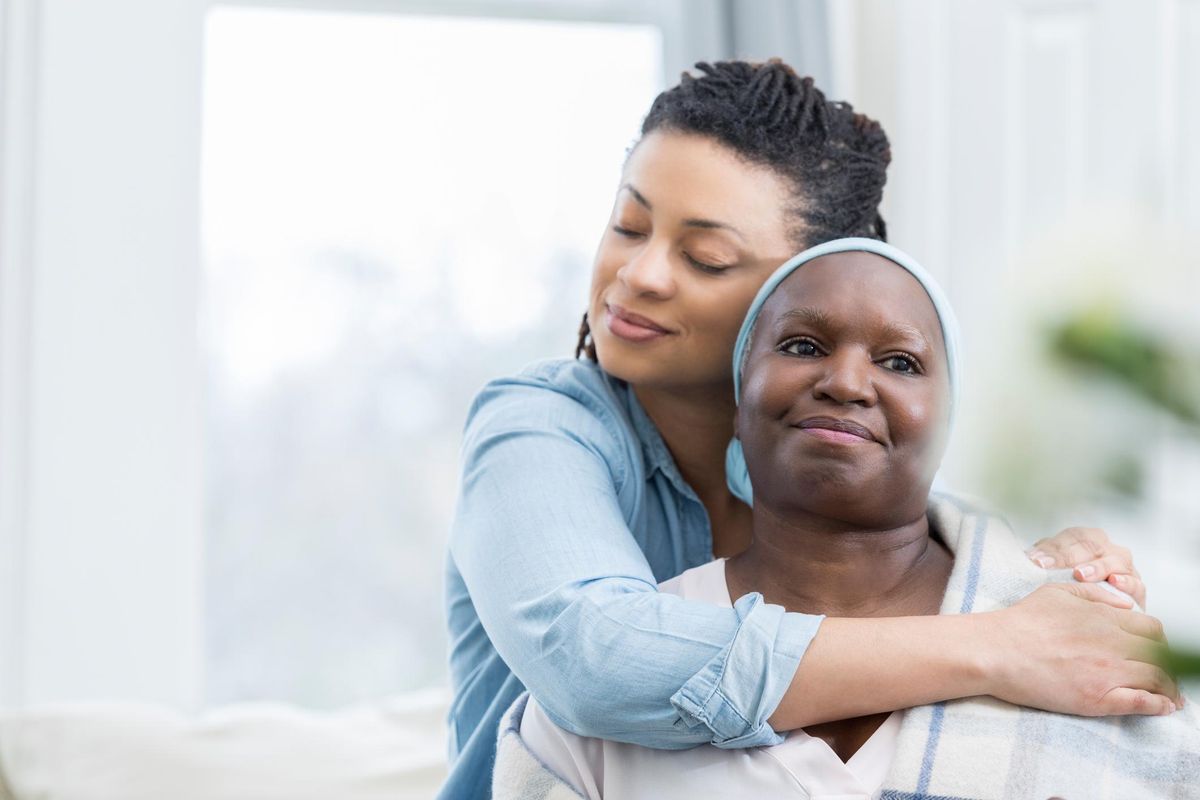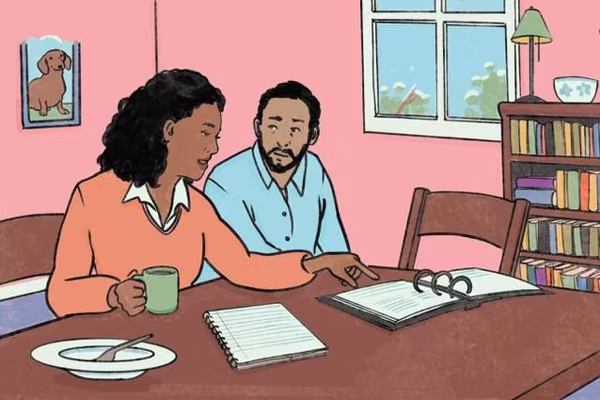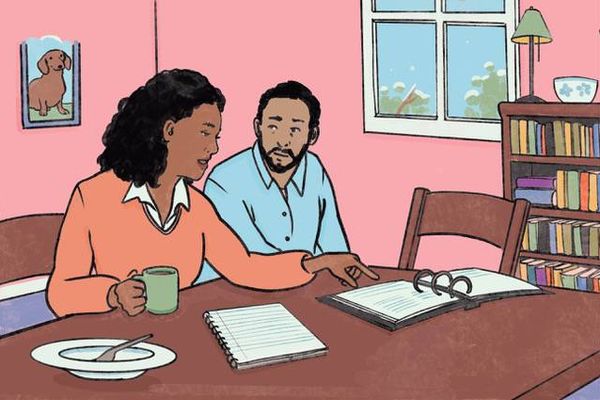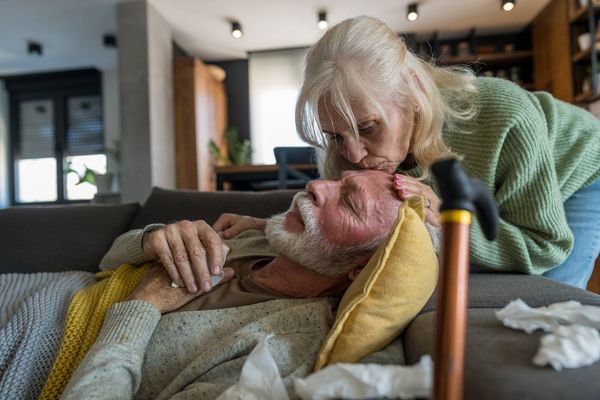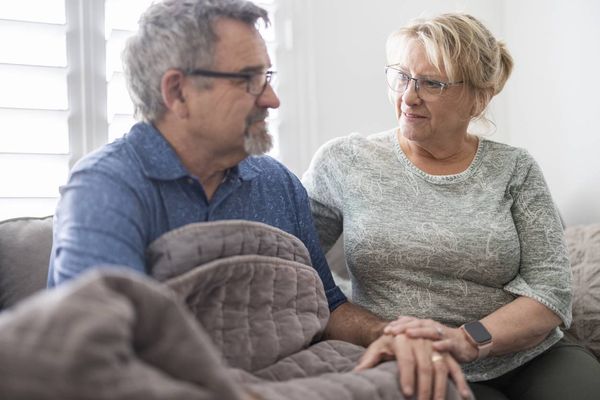Janet Meadows Harris couldn't have imagined getting two cancer diagnoses in one day until it happened in her family. Days before Christmas 2019, her husband, Alonzo, 74, was diagnosed with prostate and liver cancer. When Alonzo underwent aggressive radiation treatment on his liver, Harris, 59, became his primary caregiver.
Like millions of caregivers nationwide, Harris faced emotional, physical and financial burdens as a result of her husband's diagnoses. Everyone recognizes that cancer patients bear these burdens, but what many don't realize is that caregivers do, too. In fact, they can be especially intense for those caring for loved ones during cancer.
In 2020, HealthyWomen and CancerCare, an organization that provides support to help people manage the challenges of cancer, conducted a study to examine the effects of cancer costs on patients and caregivers. We found that caregivers reported feeling a host of negative emotions as a result of their loved one's cancer diagnosis — and specifically due to the costs of cancer — at even higher rates than the patients themselves. For example, 76% of caregivers experienced depression because of cancer costs, compared with 55% of patients. More than 70% of caregivers felt worry, frustration, stress and anxiety, while fewer than half the patients surveyed reported these feelings. Caregivers also experienced panic, distress, hopelessness, anger, feeling overwhelmed and exhaustion at much higher rates than patients.
In the survey, 43% of caregivers reported feeling that paying for the direct and indirect costs of cancer is very or extremely stressful, compared with 35% of patients. Caregivers also reported direct financial impacts — 10% took unpaid leave and 12% reduced their work hours.
Harris was lucky. As a research manager at the American Cancer Society, she had paid time off and medical leave. But by the time Alonzo had his first radiation treatment in March 2020, Harris was working from home due to COVID-19 anyway. She was able to manage his care without losing income. Other than a neighbor she paid to help a few hours per week, Harris cared for Alonzo alone.
"Nobody wants to hear how bad it is," Harris said. "This caregiving thing is not for the faint of heart. You give out emotionally, mentally … physically … it takes a toll."
In June, Harris lost her job along with her health insurance and life insurance — and she had to let her paid helper go. She has stretched her severance package for months through careful budgeting and is surviving financially "by the skin of my teeth."
I Am Not Alone — A resource for caregivers
"There's something really wrong with the way our world works in terms of caregiving," said Jessica Kim, serial entrepreneur and mother of three.
Kim discovered the challenges of caregiving the hard way when her mother's pancreatic cancer returned for the third time. On a visit home, Kim found her father exhausted and burned out and realized her parents couldn't care for themselves. She arranged for them to move in with her in early 2016. After a taxing year of juggling work, parenting and caregiving, Kim was overwhelmed. She was forced to quit her prestigious job at a venture capital firm, a role meant to propel her to new career heights, to focus on her mom's care.
Kim didn't know how long she would be away from work or whether she was permanently damaging her career. She had saved enough money to afford some time off, but she couldn't go without income forever.
"Caregiving is … so unplanned, unexpected and urgent," Kim said. "You have no idea if it's going to be nine days, nine months or nine years." Often described as a marathon, caregiving may actually be harder. Kim couldn't pace herself or plan emotionally, practically or financially.
Despite her mother's good health insurance, Kim still paid out-of-pocket for supplies, equipment and services. She spent hundreds of dollars each week on special food that often went to waste when her mother couldn't eat. Kim hired aides when she felt herself burning out — but at $10,000 to $15,000 per month, she couldn't do it for very long.
"There's just so much to support all the nonclinical aspects of cancer care that goes completely unnoticed and unbudgeted and unsupported from insurance," Kim said.
Kim's mother died on June 30, 2017. "In my deep grief, the biggest feeling I had was frustration," Kim said. "Why is no one talking about this?"
Resources exist but are hard to find, so Kim set out to make caregiving easier for others than it had been for her. She launched ianacare — for I Am Not Alone — to help caregivers identify, organize and mobilize support.
Karen Warner is another caregiver who found herself feeling alone when her husband was diagnosed with stage 4 lung cancer. To navigate the challenges of his ultimately unsuccessful 18-month battle with cancer, Warner sought a road map but found little written on caregiving best practices. She set out to write the resource she wished she'd had and eventually published her book, "The Sudden Caregiver."
Warner and Kim recommend several strategies to help caregivers emotionally and financially.
- Get organized: Warner suggests getting a binder or even a shoebox to store important information such as bills, prescriptions and care instructions. She also recommends taking photos of prescription labels so you always have them in case of emergency.
- Gather a tribe: Kim refers to core supporters as "first responders in your life." Warner calls them a "care squad." Whatever you call them, identify people you love and trust whom you can turn to when you need help. You don't owe anyone a job just because they want to help; Warner recommends only tapping people you completely trust.
- Ask for help: Many people offer help in the beginning when you may not know what you need. Warner suggests identifying tasks you're not as good at — home repairs or navigating insurance — and asking people in advance to be ready if you need help. Apply the same proactive approach to finances. If you think you might struggle with cancer-related costs, see if anyone in your network could help.
- Find resources: Kim and Warner were surprised by how many resources existed. Warner borrowed equipment from her local Council on Aging. Kim has found that many employers offer caregiving leave or other benefits. Check around and with your employer before you spend money or forgo income.
- Acknowledge gratitude: Warner wrote down what or who she was grateful for each day. "It's a crummy time and it will be for as long as it is," she said, but recognizing positives can help caregivers reframe the experience with pride and appreciation.
Caring for a loved one with cancer can be emotionally intense, scary and costly. It can also feel lonely.
"That emotional and financial burden, separately and together, is why caregiving is so hard," Kim said.
This resource was created with support from Amgen and Daiichi Sankyo.

